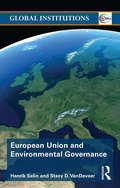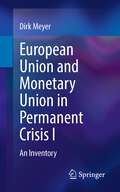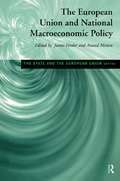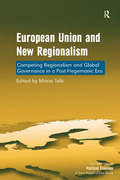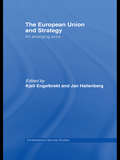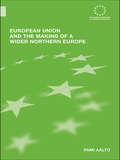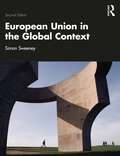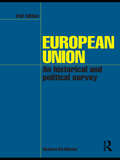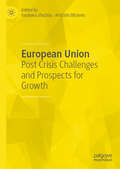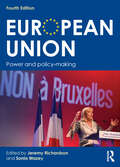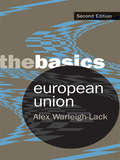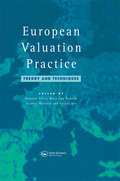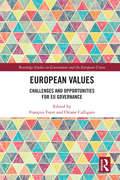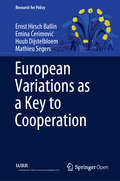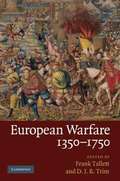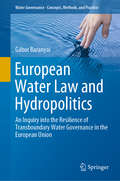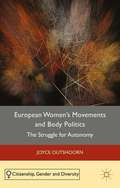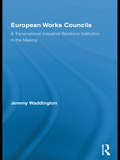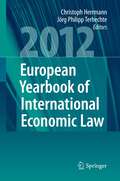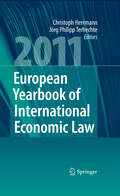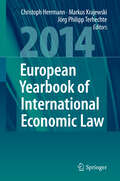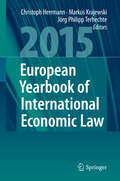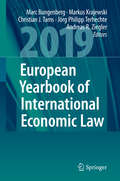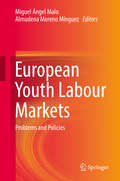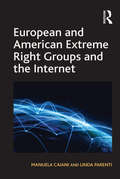- Table View
- List View
European Union and Environmental Governance (Global Institutions)
by Henrik Selin Stacy D. VanDeveerOver the past five decades, the European Union (EU) has developed into the most legally and politically authoritative regional organization in the world, wielding significant influence across a wide range of issue areas. European Union and Environmental Governance focuses on the growing global role of EU environmental and sustainable development policies. Written in a concise and accessible manner, this book introduces and examines the major European and global environmental issues, debates, and policies and provides a critical, evidence-based evaluation of the achievements and shortcomings to date in EU environmental and sustainability governance. Providing both an historical overview and a discussion of the major future legal, political and economic challenges to the realization of EU goals related to better environmental governance, the authors offer a comprehensive introduction to this key issue. This book will be useful reading for students of global environmental politics, comparative environmental politics and policy, international organizations, European politics, and environmental studies.
European Union and Monetary Union in Permanent Crisis I: An Inventory
by Dirk MeyerEuropean integration efforts are on the brink of collapse. In its current state, the European Monetary Union is unintentionally acting more as a dis-integration factor than as a unifying element. Dirk Meyer provides descriptions, analyses and background information on the current crisis. The book is the result of more than ten years of work on the subject.
European Union and National Macroeconomic Policy (State And The European Union Ser.)
by James Forder Anand MenonConsiders the way in which the European Union has affected autonomy in macroeconomic policy-making of the member states. It begins with an introduction to economic ideas, and explores current themes surrounding monetary and fiscal policy and European integration, including economic policy co-ordination, objectives in national policy-making and moti
European Union and New Regionalism: Competing Regionalism and Global Governance in a Post-Hegemonic Era (The International Political Economy of New Regionalisms Series)
by Mario TelòStemming from an international and multidisciplinary network of leading specialists, this best-selling text is fully updated with new chapter additions. With the first edition prepared at the end of the last century and the second edition adding inter-regional relations, this new edition focuses on competing models of regional cooperation within a multipolar world and the role of European Union. This new edition offers: - A comparative analysis of regional cooperation and of both US-centred and EU-centred interregionalism. - A fresh exploration of key issues of regionalism versus globalization and the potential for world economic and political governance through regional cooperation, notably in hard times. - A vigorous response to conventional wisdom on the controversial EU international identity - An appendix on regional and interregional organizations. - A key resource for postgraduate or undergraduate study and research of international relations, European integration studies, comparative politics and international political economy. Taking into account both the expanded European Union and regional cooperation in every continent, this multidisciplinary volume comprises contributions from established scholars in the field: A. Gamble, P. Padoan, G. Joffé, G. Therborn, Th. Meyer, R. Higgott, B. Hettne / F. Ponjaert, F. Soederbaum, Ch. Deblock, K. Eliassen / A. Arnottir, S. Keukeleire / I. Petrova, S. Santander and M. Telò (editor).
European Union and Strategy: An Emerging Actor (Contemporary Security Studies)
by Kjell EngelbrektThis edited volume sets out to explore the paradox that the European Union (EU) produces policies with strategic qualities, but lacks the institutions and concepts to engage in strategic reasoning and action proper. The book has a two-fold agenda, exploring current EU external policies that are, or seem to be, linked to strategic priorities, and also studying the concept of strategy in the particular context of EU decision- and policymaking. The volume first examines the character of the Union as a strategic actor at this stage of its development. It then explores the ability of the Union to act and otherwise influence both its periphery and the wider world, focusing in particular on how it is perceived by other actors. The final section comprises personal assessments by a group of contributors regarding the character of the union as a strategic actor in the present and future. When these are pieced together, a picture emerges of a European strategy in the making, albeit one that so far is modest and partial. This book will be of interest to students of European Security, European Politics and IR.
European Union and the Making of a Wider Northern Europe (Routledge Advances in European Politics #Vol. 38)
by Pami AaltoThis book is the first comprehensive study of how and why the European Union has enlarged to become northern Europe’s leading power. Pami Aalto presents a new approach to the under-theorized field of EU foreign policy studies, showing how, since 1990, the EU has enlarged to include Finland, Sweden, Estonia, Latvia, Lithuania and Poland, and also incorporated the former East Germany. He also examines how this northern expansion has led the EU to reflect on relations with Russia and its north-western regions. This unique study includes: a fresh approach to the under-theorized field of EU foreign policy key empirical material, including hundreds of documents, interviews and field experiments in-depth case studies of relations between the EU, Nordic states, Baltic states and Russia with its north-western regions. This is essential reading for all students of European politics, Russian studies and international relations.
European Union in the Global Context
by Simon SweeneyEuropean Union in the Global Context explores the interplay between the state and state sovereignty, nationalism, European integration and globalisation. It provides essential foundations in these areas, while using stimulating arguments to prompt discussion and provoke interest in the relationships between these processes. It critically analyses the challenges faced by the EU from the contemporary political and economic dynamics of globalisation (IPE), including trading relationships set through the WTO and bilateral relations with emerging markets, especially the BRICS economies. Likewise, pressures from within, such as a resurgence of nationalism, localisation, anti-austerity politics, and Euroscepticism, are examined. While the Union is fundamentally challenged by pressures from above and below, and by its own internal dysfunction, it remains central to the effective management of the international political economy. European Union in the Global Context is a lively, focused and engaging text, incorporating anecdotes and contemporary arguments, and presenting different perspectives on European integration and globalisation. It will be of key interest to students of European Politics, European Studies, European Union Studies, and more broadly, global political economy, foreign and security policy and international relations.
European Union: An Historical and Political Survey
by Richard McAllisterThe new edition of this best-selling text provides the most up-to-date single volume history of the European Union from its origins through to the present day. Fully updated and revised throughout, this is the ideal starting point for students and others wishing to read an accessible, readable and comprehensive account of the development of the EU. Topics new to this edition: The impact of the Euro and economic and monetary union. Analysis of post-9/11 splits in the EU over Afghanistan and Iraq, and debates on the New European security order and the threat posed by terrorism. The enlargement of the EU to 27 members and discussions over further expansion. The initial failure of the EU Constitutional Treaty. The growth in Euroscepticism across the continent. An engaging contribution to the understanding of the past, present and uncertain future of European integration, European Union is essential reading for all students of European history, European Union politics, and International Relations.
European Union: Post Crisis Challenges and Prospects for Growth
by Aristidis Bitzenis Vasileios VlachosThis book discusses the unprecedented impact of the financial and economic crisis on government finances and economic performance across Europe, which has raised skepticism on the ability of the current course of integration to promote prosperity. Correspondingly, the European Union is about to contract for the first time in its history. This timely book covers the economic issues that challenge the future of integration in Europe. The chapters are authored by international experts and examine current and emerging challenges and trends for the European Union: economic convergence, monetary policy, competition law, transport policy, the informal sector, employment, recovery and enlargement. Four chapters focus on Greece, which has been the greatest challenge faced by European institutions in the context of the sovereign debt crisis, and one chapter discusses the possible costs of Brexit. The reader will benefit from understanding the key economic challenges, which, if effectively addressed, will lead to deepening the union, or in contrast to a multi-speed Europe.
European Union: Power and policy-making
by Jeremy Richardson Sonia MazeyA key textbook for undergraduate and postgraduate students of contemporary European politics, European Union: Power and policy-making 4th edition offers a comprehensive and accessible analysis of the European Union policy process. Intended to advance understanding of the EU as a now mature and ongoing policy system, this book addresses the central issues relating to the distribution of power and influence in the European Union including: Theoretical perspectives The roles of key institutions in the processing of policy problems Different channels of representation The EU as a policy-making state Written by a distinguished group of international scholars, this new edition will also appeal to the worldwide community of researchers on the EU. New to this edition:? New chapters on The Politics of Multispeed Europe, The Distribution of Power Among Institutions, EU Agencies, Covert Integration in the European Union, and Political Representation and Democracy in the EU. New authors and theoretical approaches on many topics such as differentiated integration, opt-outs and multi-speed integration, negotiation and coalition building, the interplay of judicial and legislative policy-making, power distribution, agency behaviour, integration by subterfuge, the democratic deficit fully updated data and content throughout Jeremy Richardson is joined by a co-editor, Professor Sonia Mazey, for the fourth expanded edition of this highly regarded textbook on the EU. Jeremy Richardson is an Emeritus Fellow at Nuffield College, Oxford, UK, and Adjunct Professor at the National Centre for Research on Europe, University of Canterbury, New Zealand. He is also Founder and Co-editor of the Journal of European Public Policy Sonia Mazey is a Professor and Pro-Vice-Chancellor of the College of Business and Law, University of Canterbury, New Zealand and formally a Fellow of Keble College, Oxford, UK
European Union: The Basics (The Basics)
by Alex Warleigh-LackFully updated to include the new Treaty of Lisbon, this is the best short and accessible introduction to the politics of the European Union, written by one of the world's most well-known authorities in the area. Ideal starting reading for students and the general reader, it explains in clear jargon-free language: the EU's development to date how the EU works, and why it works this way the EU's major policies the EU's biggest problems and controversies the EU's likely evolution in the coming years. The new edition builds on the strengths of the previous edition and now includes extra material on: the Treaty of Lisbon the EU's development since 2003, including its enlargements in 2004 and 2007 recent EU policies and rule changes the EU's role in the world. Key features to help learning and understanding are: boxed descriptions of key issues and events a guide to further reading at the end of each chapter a glossary of key terms, concepts and people helpful appendices about the EU's member states and good internet sources.
European Valuation Practice: Theory and Techniques
by A. Adair M.L. Downie S. McGreal G. VosThe variability of valuation practice within Europe is perceived as a problem within the globalization of property. This edited textbook examines the practice of real estate valuation in selected countries in Europe. The focus is on countries with well developed real estate markets in which both international and indigenous investors are active. The book is aimed at real estate professionals, financiers, institutional advisers, property researchers and students who require a greater understanding of comparative property appraisal techniques applied across Europe.
European Values: Challenges and Opportunities for EU Governance (Routledge Studies on Government and the European Union)
by François Foret Oriane CalligaroRedefinitions of EU borders (enlargements, Brexit), geopolitical challenges (conflicts, migrations, terrorism, environmental risks) and the economic and financial crises have triggered debates on the common values that hold European countries and citizens together, justify public action and ensure the sustainability of European governance. This book discusses the genesis of and increasing references to "European values", their appropriation by diverse groups of actors and their impact on public action. It argues that European values are a broad and flexible symbolic repertoire, instrumental to serving diverging ends, and a resource for both negotiation and conflicts. Looking at the broader picture, the book reflects on the role of values in the institutionalization of the EU as a political order and paves the way to an assessment of its singularity in comparison with other polities across time and space. This text will be of key interest to scholars, students and practitioners in EU politics, comparative politics, IR, public policy, sociology and cultural studies.
European Variations as a Key to Cooperation (Research for Policy)
by Huub Dijstelbloem Ernst Hirsch Ballin Emina Ćerimović Mathieu SegersThis Open Access book offers a novel view on the benefits of a lasting variation between the member states in the EU. In order to bring together thirty very different European states and their citizens, the EU will have to offer more scope for variation. Unlike the existing differentiation by means of opt-outs and deviations, variation is not a concession intended to resolve impasses in negotiations; it is, rather, a different structuring principle. It takes differences in needs and in democratically supported convictions seriously. A common core remains necessary, specifically concerning the basic principles of democracy, rule of law, fundamental rights and freedoms, and the common market. By taking this approach, the authors remove the pressure to embrace uniformity from the debate about the EU’s future. The book discusses forms of variation that fall both within and outside the current framework of European Union Treaties. The scope for these variations is mapped out in three domains: the internal market; the euro; and asylum, migration and border control.
European Warfare, 1350-1750
by Frank Tallett D. J. B. TrimThe period 1350-1750 saw major developments in European warfare, which not only had a huge impact on the way wars were fought, but also are critical to long-standing controversies about state development, the global ascendancy of the West, and the nature of 'military revolutions' past and present. However, the military history of this period is usually written from either medieval or early-modern, and either Western or Eastern European, perspectives. These chronological and geographical limits have produced substantial confusion about how the conduct of war changed. The essays in this book provide a comprehensive overview of land and sea warfare across Europe throughout this period of momentous political, religious, technological, intellectual and military change. Written by leading experts in their fields, they not only summarise existing scholarship, but also present new findings and new ideas, shedding new light on the art of war, the rise of the state, and European expansion.
European Water Law and Hydropolitics: An Inquiry into the Resilience of Transboundary Water Governance in the European Union (Water Governance - Concepts, Methods, and Practice)
by Gábor BaranyaiThis book provides the first comprehensive assessment of the various issues faced by countries in the European Union, where progressing climate change and urbanization pose significant cooperative challenges in a large number of river basins. Conducting a thorough analysis of the intricate web of EU water governance, it reveals that the hydropolitical stability of the European Union is already at risk. Further, given the structural nature of the shortcomings in EU water policy—e.g. the rigidity of the EU’s founding treaties or the institutional complacency of the European Commission—the book argues that these risks are likely to turn into sources of prolonged conflict, unless EU decision-making bodies take steps to address the new hydrological realities early on.
European Women?�s Movements and Body Politics
by Joyce Outshoorn Radka Dudov� Ana Prata Lenita FreidenvallTaking a long-term historical view, this book examines how women's and feminist movements have contested the dominant discourses and state politics that have impeded women's autonomy over their bodies since the late 1960s. Citizenship is usually understood as guaranteeing political, social and economic rights, but women's movements have sought to extend it to include women's rights to bodily integrity. This book examines two important facets of this struggle, namely prostitution and the right to abortion, as they relate to four countries- the Czech Republic, the Netherlands, Portugal and Sweden- with special attention paid to how migration and Europeanization has affected political debates and policies. The authors show how policy legacies from the past partly determine outcomes, but also how women's groups have been key to policy change. They also make the case for expanding how we define citizenship to include bodily integrity, reinforcing women's right to autonomy in this new era of biotechnological revolution.
European Works Councils and Industrial Relations: A Transnational Industrial Relations Institution in the Making (Routledge Research in Employment Relations)
by Jeremy WaddingtonThe creation of European Works Councils is arguably the most important measure taken in global industrial relations in recent years. Adopted with the primary goal of facilitating European-level workers’ participation in information-sharing and consultation in multinational companies, EWCs have also been central to a wide-ranging process of institution-building at the European level. European Works Councils charts the growth in the number of EWCs and the development of practices associated with EWCs between 1994, when legislation on EWCs was adopted, and 2009, when the initial legislation was amended. Drawing on original, large-scale, survey data, the book shows that the quality of information and consultation is generally poor, thus bringing into question the soft touch legislative approach to employee participation of the European Commission. The reforms implemented within trade union organizations to accommodate the development of EWCs are explored, together with the initiatives taken to extend the role of EWCs beyond information and consultation to incorporate negotiation. Articulation between EWCs and trade union organizations is shown to be integral to EWCs as institutions of information and consultation, and as a means to influence managerial decision-making. Similarly, the development of EWCs is shown to be a process contested by employers’ organizations and managers on the one hand and labour organizations on the other. The character of this contestation ensures that the category ‘EWC’ includes a wide range of institutional forms and practices.
European Yearbook of International Economic Law (EYIEL), Vol. 3
by Christoph Herrmann Jörg Philipp TerhechteThe third volume of the European Yearbook of International Economic law focuses on two major topics of current academic and political interest. Firstly, it adresses the 10th anniversary of China's accession to the WTO and its implications; secondly, it deals with different legal aspects of global energy markets.
European Yearbook of International Economic Law 2011
by Christoph Herrmann Jörg Philipp TerhechtePart one of Vol. 2 (2011) of the European Yearbook of International Economic Law adresses two major topics of current academic debate and public interest: firstly, it focuses on the State and the Global Economy, secondly, on Climate Change and International Economic Law. Part two contains treatises of recent regional integration developments taking place in the major regions of the world. Part three covers the legal and political developments in the major international organizations and fora dealing with international economic policy making. Part four contains book reviews of recent works in the field of International Economic Law.
European Yearbook of International Economic Law 2014
by Markus Krajewski Christoph Herrmann Jörg Philipp TerhechteIn 2014, the global economic system celebrates two anniversaries: Seventy years ago, on 22 July 1944 at Bretton Woods, New Hampshire, the Articles of Agreement of the International Monetary Fund (IMF) and the Articles of Agreement of the International Bank for Reconstruction and Development (Worldbank) were adopted. Since then the global financial and monetary system underwent significant policy changes, but the institutional framework remained the same. More recently, twenty years ago, on 15 April 1994, the Final Act of the Uruguay Round of Multilateral Trade Negotiations was signed and its key component, the Agreement establishing the World Trade Organization, entered into force on 1 January 1995. Even though the beginning of the multilateral trading system dates back to the late 1940s, the founding of the WTO constitutes a significant institutional reform which marks the beginning of a new era. Anniversaries are usually moments of celebration. However, even a superficial observer will notice that neither the current international financial and monetary regime nor the international trade regime is in a stage which invites celebration. Instead, both are facing difficult and fundamental challenges to their very existence from the outside but also from within. So while there may be no time to celebrate, anniversaries are also often used for reflection about the past and the future. Hence, EYIEL 5 (2014) considers these two anniversaries ample moments to reflect on the legacy and the current status of the main two pillars of International Economic Law in its Part one. Part two of EYIEL 5 (2014) brings together contributions on the EU’s Deep Trade Agenda, on Current Approaches to the International Investment Regime in South America, on the Multilayered System of Regional Economic Integration in West Africa and on the Tripartite Free Trade Area, as well as on India and her Trade Agreements. Part three contains treatises of developments in the World Customs Organization, the World Intellectual Property Organization and in International Investment Law. After the book reviews in Part four, EYIEL 5 (2014) is complemented with an Annex containing the Case (on exchange-rate manipulation and crisis-caused guarantees to financial institutions) and the Best Submissions of the 11th EMC2 ELSA WTO Moot Court Competition (of the Harvard team for the complainant and the Leuven team for the respondent). The case not only addresses issues of current interest but also links the subjects of our two special focusses nicely together.
European Yearbook of International Economic Law 2015
by Markus Krajewski Christoph Herrmann Jörg Philipp TerhechteThis sixth volume (2015) of the European Yearbook of International Economic Law puts a particular emphasis on non-tariff barriers (NTBs) to trade and the world trade order. With the steady reduction of tariff rates since the GATT 47 came into force, focus in recent years has been on the vast and complex landscape of non-tariff barriers to trade. States as well as scholars seemingly struggle with the multitude of measures pooled under this expression as there is no single, acknowledged definition of the term, and its relation to the term "non-tariff measures" remains equally blurred. Particularly in practice and on a multilateral level, there appears to be some awkwardness when it comes to coping with NTBs since multilateral trade rules seem to be in conflict with national regulatory autonomy in the pursuit of policy objectives. In part one, this volume sheds light on the problems of non-tariff barriers to trade that arise in various fields. Part two focuses on regional integration with an emphasis on relations between East Asia and the European Union. In this regard, the authors outline the trade and investment relations between the European Union and East Asia, including Japan, Korea and Singapore. Part three offers an overview of recent institutional developments in WIPO, ICSID, WTO and WTO jurisprudence. Part four includes book reviews of recent works in the field of international economic law, and part five introduces a new section on publications in the field of international economic law that were released in 2013 and 2014.
European Yearbook of International Economic Law 2019 (European Yearbook of International Economic Law #10)
by Markus Krajewski Jörg Philipp Terhechte Marc Bungenberg Andreas R. Ziegler Christian J. TamsVolume 10 of the EYIEL focusses on the relationship between transnational labour law and international economic law on the occasion of the 100th anniversary of the International Labour Organisation (ILO). As one of the oldest UN Agencies, the ILO has achieved considerable progress with respect to labour rights and conditions. The contributions to EYIEL Volume 10 assess these achievements in light of current and future challenges. The ILO’s core instruments and legal documents are analysed and similarly the impact labour standards have on trade and investment agreements. In its regional section, EYIEL 10 addresses recent developments in the US and the EU, including the US’ trade policy strategy towards China as well as the reform of the NAFTA. In its part on institutions, EYIEL 10 focusses inter alia on the role of the rule of law in relation to current practices of the International Monetary Fund and of the WTO’s Appellate Body as an international court. Furthermore, it provides an overview of current cases before the WTO. Finally, the volume entails a section with review essays on recently published books in the field of international economic law and international investment law.
European Youth Labour Markets: Problems and Policies
by Miguel Ángel Malo Almudena Moreno MínguezThis timely analysis examines the complex state of youth unemployment across Europe and offers cogent policy suggestions for addressing this longstanding societal problem. The findings reveal numerous national and regional factors affecting youth joblessness—not only market and economic challenges, but also deep sociocultural and political dynamics underlying the situations. Coverage details how the standard transition from school to work is disrupted in an already depressed adult job market, and compares a wide range of responses in terms of both young people’s educational decision-making and national youth policy. In particular, contributors assess whether the current crop of Youth Guarantee programs can/should be a model for employment policy across the continent.Among the topics covered:Youth labour market prospects and recent policy developments.Youth labour market in Central and Eastern Europe.Early school dropout in Spain: evolution during the Great Recession.Overeducation among European university graduates: a constraint or a choice?Promoting youth employment in Europe: evidence-based policy lessons.The evaluation of a Finnish youth guarantee: lessons for Europe?European Youth Labour Markets is of interest to an international audience of economists, sociologists, and leaders in governmental, non-profit, and corporate sectors through its broad and comparative macroeconomic focus and implications for policymaking, research, resource allocation, and policy evaluation.
European and American Extreme Right Groups and the Internet
by Manuela Caiani Linda ParentiHow do right-wing extremist organizations throughout the world use the Internet as a tool for communication and recruitment? What is its role in identity-building within radical right-wing groups and how do they use the Internet to set their agenda, build contacts, spread their ideology and encourage mobilization? This important contribution to the field of Internet politics adopts a social movement perspective to address and examine these important questions. Conducting a comparative content analysis of more than 500 extreme right organizational web sites from France, Germany, Italy, Spain, the United Kingdom and the United States, it offers an overview of the Internet communication activities of these groups and systematically maps and analyses the links and structure of the virtual communities of the extreme right. Based on reports from the daily press the book presents a protest event analysis of right wing groups’ mobilisation and action strategies, relating them to their online practices. In doing so it exposes the new challenges and opportunities the Internet presents to the groups themselves and the societies in which they exist.
